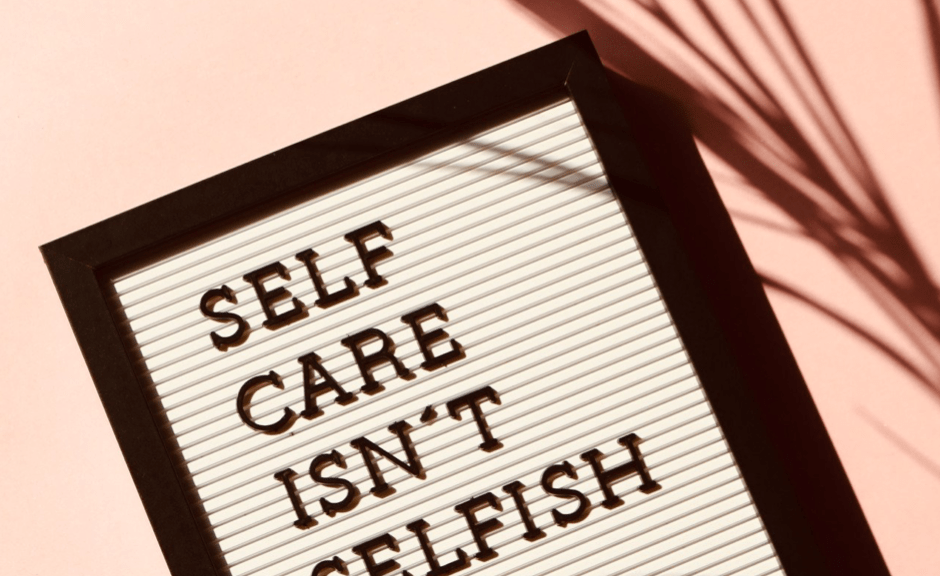
When Christian Nice Demonizes Self Care
So this past week I saw a post by a male Christian that suggested in the new year we “serve others rather than ourselves,” and I wanted to analyze today all the many problems with that much-too-prevalent statement today as a one-size-fits-all rule. And especially put it into the broader contexts of societal hierarchies that help demonize self care for many populations in unhealthy ways. In short, this blog post will unwrap how this kind of theological false dichotomy, when applied, can do great damage, and why we should work hard to get past it, both in the new year and always.
My Background and Context for This Discussion
Okay, so there are a lot of directions I could go with this analysis as a communication scholar who grew up as a pastor’s kid in a moderate denomination in the Midwest US. Let’s just say I’ve seen this kind of statement—that we should serve others, and not just serve others, but more than and rather than ourselves—A LOT.
When you grow up around something, it seems normal to you. When you grow up around a chronic issue you often don’t even realize it’s a problem—or at least could be a problem for a lot of audiences, in a lot of contexts.
Such is the case with statements like this. It took me until I was regularly studying and teaching about conflict styles to realize how incredibly unhealthy many spiritualities around service and self-care were.
Disclaimers Before We Go Further
Note: I’m speaking here ecumenically of Christian-informed spiritualities and theologies. I’ve seen a lot of this attitude in my moderate denominational upbringing, but I’ve seen it in other more progressive Christian contexts too, and in fact in other types of spiritualities as well, especially in my white middle class Midwestern upbringing.
I’m addressing Christian contexts here both because this is what I know best and also because Christianity is the religion with the loudest voices in the US context. And the unhealthy twisting of perfectly good ideas—like serving others—is causing a lot of damage when it creates shame and moral disgusts in vulnerable populations.
That damage is what I’m focusing on here. In doing so, I’m building on several past themes addressed in this blog, including the toxic side of Christian nice (I addressed this in a series starting here), questions around moral disgusts (I addressed this in a series starting here), and questions around god terms and devil terms (I addressed this in a series starting here).
Diving In: What Conflict Styles Have to Do with Self- and Other-Care
Here’s what I’ve realized: many swaths of the Christian church—especially those with strong “Christian Nice” components like the ones I grew up with—see the conflict style of accommodation to others as the highest form of spirituality.
Statements like the above are usually the ways these types of things are expressed.
The Theology Behind Accommodation as God-Term
The theological logic behind this false dichotomy often goes like this: Satan and Adam and Eve both put themselves first, and asked for things for themselves. By doing so, they were disobedient to God, and essentially became enemies of God. In this theological view, taking care of God and others is seen as a god term—something to be defended at all costs, while looking out for yourself is seen as a devil term (things to be fought at all costs).
The conclusion from this is drawn that when Jesus said to love your neighbor as yourself, he’s not really talking about loving yourself. The idea is that with our fallen natures, we already automatically do that. It’s part of our fallen nature, after all—something to be fought internally and externally.
I Don’t Think This Theology’s All Bad—It’s Just Partial in an Unhealthy Way
Let’s be clear: I don’t think this view is fully rotten through and through. I think it has valid points in parts. I mean, we all have times when we look out for ourselves at the expenses of others, and times when we should be serving others more than ourselves. But it’s just not nearly nuanced enough to fit reality well. And because of that, it has often been harmful, as I will explain.
So yes, that’s the much too limited deal—and a big part of the problem is that it doesn’t even take into account the nuance the Bible itself provides in key passages. Never mind that Jesus never really set up a hierarchy between loving God, others, and ourselves in that statement in the New Testament. Never mind that Jesus himself modeled time away for self-care. Never mind that Jesus and the prophets regularly spoke up against accommodating to the wrong types of people and unhealthy rhetoric and systems.
This Partial View of the World Is Disturbingly Zero-Sum
What this limited theology does in essence, unfortunately, is set up a zero-sum theology of the world in which those who follow it, especially those who are already vulnerable, are being hurt even more. Stick with me and I’ll explain how.
As a reminder, a zero-sum view of the world is one that sees the world as made up always and forever of winners and losers—and ONLY winners and losers. In other words, in this view of conflict, if one person wins, another person always loses.
So in other words, if you advocate for your needs at all, then God and others must be losing.
Breaking Down the Dichotomies
There are loads of problems to zero-sum views.
Sure, some things ARE zero-sum. Sometimes someone wins and another person loses.
But both stress research and conflict studies shows that the literally healthiest ways to go about things can involve a benefit to both parties.
In short, in the healthiest ways of thinking and being, it’s entirely possible to both love your neighbor AND yourself at the same time.
It doesn’t have to be an either/or thing.
Reaching Toward a Healthier Model of Mutuality
Let me say that again, for emphasis: in many cases, you can love yourself AND your neighbor at the same time.
It doesn’t have to be serve others to your detriment—which is often what seeing accommodation as the healthiest form of spirituality leads many to. It can be take care of yourself so you can healthily take care of others, and seek help from others as you need it. And others can take care of themselves and also ask for help as they need it.
Each of us has strengths and weaknesses, and areas of expertise, and can help each other mutually with them.
It can be a beautiful thing.
Sometimes the Accommodation Message Is Apt
But here’s the thing: there ARE people who do need to hear the fact that we should love others more than ourselves. This is why this kind of statement is there in the Bible. For narcissistic personalities and others with a lot of privilege, this kind of statement is totally situationally on the mark.
But We Ought Not to Overaccommodate to the People Who Need the Message Most
And unfortunately, often those kinds of people who need the serve others message have been accommodated to too much, both in the church and out. This kind of one-size-fits-all accommodationist theology unfortunately, viscerally, because it sees accommodation and service to others as the highest good, much too often ends up serving these kinds of unhealthy and corrupt individuals.
And, let’s be clear—this is how fascistic authoritarianism, white supremacy, and other abusive systems ends up being served by this theology.
When Competition Is a Healthy Conflict Style
This is why, as liberation theology so rightly points out, there’s so much in the Bible about speaking truth to those who exploit others. See, the Bible doesn’t see accommodation as the highest form of spirituality in all situations. On the contrary, the Bible thinks it’s important to speak truth to power and corruption.
Healthy Self-Care as a Form of Resistance
And self-care, as I’ll explain, can be an important form of resistance within that framework.
Let me explain.
Here’s the thing: it’s important to do what we can to take care of ourselves. And it’s important to do what we can to take care of others. It doesn’t always have to be zero-sum—often it can be collaborative, where we work to assertively take care of both our needs and those of others.
And yes, sometimes there are winners and losers, and that needs to be adjusted. Sometimes other unhealthy individuals make it zero-sum whether we like it or not.
When “Serve Others Not Yourself” Becomes Projected Shadow
Unfortunately often it’s the privileged and the narcissistic folks who are the ones who deliver this “serve others rather than yourself” message out to others.
This often turns out to be a form of projected shadow, which means that it seems to be something people aren’t dealing with themselves so they’re pushing it outward to ask others to take up their slack.
In short, those who share this message too often tell others to serve others because (1) they themselves wish to be served; (2) they themselves are not good at serving or humility and want others to do that for them. Other share this message unwittingly on the behalf of these individuals and groups. Ultimately all of these efforts enable those unhealthy people at the top of the heap to maintain power.
How “Serve Others” Theology Unhealthily Intersects with Human Giver Syndrome
This brings me to one of the many helpful concepts that Emily Nagoski and Amelia Nagoski talk about in their book Burnout: their description of human giver syndrome and its negative health impacts on many. Drawing on feminist academics’ work, the Nagoski sisters helpfully talk about how some people in patriarchy and other unhealthy systems are allowed to be human beings, who have the option of either serving or being served while others are expected to be human givers only.
Women and minorities and poor people and other marginalized populations are often expected to be the givers in society. Too often these groups, who are often lower on the societal hierarchies, are unfortunately often scorned for having needs. Meanwhile, the human beings in society too often exploit their labor.
How Human Giver Syndrome Contributes to Ill Health for the Over-Givers
As the Nagoski sisters point out, this situation too often leads to genuine ill health for the human givers. It very frequently leads to burnout and trauma for the givers. And since burnout often has negative health consequences, this means that human giver syndrome literally hurts people.
So this false dichotomy theology I outlined above—the “serve others rather than yourself” theology—is really literally unhealthy when it gets internalized by these populations. It deepens this unhealthy situation. It literally hurts people, especially when paired with the message that it’s immoral or at least faintly disgusting to have to take care of ourselves.
And that last part–that can become an unfortunate side effect for both human givers and for human beings.
Why We Need to Push Back Against the False Dichotomies
THIS is why we need to push back against this kind of one-size-fits-all spirituality when it comes to giving.
See, these theologies of serving others above ourselves are often really needed by some people: those who are already allowed to be society’s human beings. It’s also helpful for those who are in healthy ecosystems of mutual self- and other-care. (And, in fact, all of us need the reminder occasionally that accommodation can be helpful at times.)
Unfortunately, though, it’s too often the human givers in society who hear them and internalize them most. And since society already tells these people that they aren’t really valuable human beings without giving to others, the extra dose of theology doubling down on that message is unhelpful, to say the least. Human givers often need to hear most that they are worthy of having their needs met, as a form of balance.
My Proposed Solution
My proposed solution to this dilemma? We should be speaking back assertively against unhealthy one-size-fits-all applications of this sort of statement. We ought to re-enable a way more mutual spiritual economy of giving and receiving that does not prop up unhealthy exploitation.
Sometimes we need to care for ourselves more, and sometimes other people more, and sometimes–many times–we can do both things at once. Recognizing that this is a natural tension that will need different answers in different relationships and situations is important.
Advocating for the Human Givers’ Needs to Be Met
And we need to realize that for many people and in many situations, especially for those who are being societally pushed into the human giver role, “serve others rather than yourself” is a super toxic message that can be very harmful.
With and for those people, we need to break down unhealthy theological and spiritual dichotomies. We need to advocate for a spirituality of mutual self-care combined with helping one another. And we should work to push back against the behavior of the truly unhealthy human beings that really need the serve others rather than yourself message.
We also need to advocate for policies and practices that relieve the burden of human givers in helpful ways. Because human givers deserve external care as well as self-care.
Some Charges Going Forward
As we move into this new year and always, may we continue the good work of speaking truth to unhealthy blanket statements that can hurt people if used indiscriminately. May we remove the shame from healthy self-care that helps us help both ourselves and others. And may we continue to competitively stand against true selfish exploitation of others as well.
And, last but definitely not least, may we advocate for policies that provide more resources for the human givers in our society so they have the resources they need.
A Final Charge
Go team #AssertiveSpirituality! Let’s continue to do what we can where we are with what we’ve got to keep speaking up against the toxic crap toward a healthier world for us all. We can do this thing.
Looking for more resources toward speaking up for what’s right and dealing with the conflict that results?
Boy, do we have got a free “Assertive Spirituality Guide to Online Trolls” for you. It actually helps you with conflict both online and off. To get it, sign up for our email newsletter (either in the top bar or by checking the appropriate box when commenting on this article). Once you’ve confirmed your email address, we’ll send you the link to the guide in your final welcome email. You can unsubscribe at any time, but we hope you’ll stick around for our weekly email updates. As soon as we feasibly can we’re hoping to offer more online courses and other support resources for those advocating for the common good, and if you stay subscribed, you’ll be the first to know about these types of things when they pop up.


5 thoughts on “When Christian Nice Demonizes Self Care”
How do you relate this message with the story of the widow’s offering (Luke 21:1-4) where Jesus holds the widow who gave everything that she had as a model for the disciples and us? The story of the widow pertains to money on one level; however it has been expounded upon to deal with talents and one’s energy.
I mean, it’s important to look at that observation by Jesus in light of the lack of generosity of the rich. He wasn’t commenting on her sacrifice as the end all, be all or suggesting she ought not take care of herself as much as critiquing how cheap the rich people were being in contrast. Jesus often used hyperbole to prove his points, as was the habit of rabbis of his day, from what I understand. Hope this clarifies my perspective.
I am not Christian and I thoroughly enjoy reading your columns. I find your insights very refreshing, especially having come from a Christian background. I share some of your columns through various social media because your voice is one that people really need to hear. Thank you for all you do!
Matthew 22:36-40 (NIV) does not say “love others and yourself” but “love others as yourself.” It’s likened to loving God. I take this to mean that loving others means seeing God in them and loving God means seeing God in myself.
“Teacher, which is the greatest commandment in the Law?”
Jesus replied: “‘Love the Lord your God with all your heart and with all your soul and with all your mind.’ This is the first and greatest commandment. And the second is like it: ‘Love your neighbor as yourself.’ All the Law and the Prophets hang on these two commandments.”
Typo. Loving yourself means seeing God in yourself.